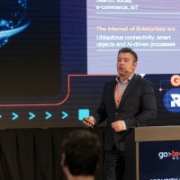

Cynet and Elastic Security are two competing cybersecurity solutions. While Cynet has an edge in ease of deployment and customer service, Elastic Security's extensive features give it a competitive edge despite its higher cost.
Features: Cynet provides automated response, endpoint protection, and user-friendly interfaces. Elastic Security offers detailed analytics, high customizability, and extensive integration capabilities.
Room for Improvement: Cynet needs better reporting tools, more integrations, and enhanced network visibility. Elastic Security could improve its documentation, simplify its setup process, and provide faster customer support responses.
Ease of Deployment and Customer Service: Cynet is known for its straightforward deployment and robust customer service. Elastic Security has mixed reviews regarding deployment complexity and responsiveness, giving Cynet an advantage in these areas.
Pricing and ROI: Cynet offers competitive pricing and a quick ROI, making it attractive for cost-conscious businesses. Elastic Security, though costlier, provides a high ROI justified by its extensive capabilities, making it seen as worth the investment by many users.
The return on investment with Cynet is pretty good, as it doesn't require a dedicated resource to manage, being highly automated.
It does not require hefty security budgets and can be deployed for enterprise security effectively.
Their SOC side support, when a threat is detected, is excellent.
My experience with the technical support of Cynet is excellent; they are just one click away.
Based on our needs, they schedule remote sessions and resolve the issues.
Support is prompt and helpful.
Most of the time when my team encounters issues, they receive responses within 24 hours.
I have not faced any difficulties with Elastic Security, as we have a pretty good support service from them.
The solution is highly scalable.
We can deploy Cynet for 50,000 users, and we have deployed it at that scale, with the capability to scale higher to 100,000 users without any challenges.
Cynet is very scalable.
It allows us to think about specific use cases, such as gathering malicious IPs in a single view and analyzing threats based on geolocation.
Elastic Security is quite scalable.
Within six years of usage, we have not had any issues such as outages or downtime.
In terms of stability, I would rate Elastic a solid eight out of ten.
There should be more options than deploying solely through group policy, as the assumption that GPO is working isn’t always the case.
Having a DLP feature would also add value.
Integration with local Active Directory, not only Azure AD, is a must.
CrowdStrike and Defender have more established threat intelligence integration due to having a larger client base.
My security testing team continuously reports vulnerabilities, and we have to fix and update the versions frequently.
Machine learning algorithms become better with time; as they ingest a huge volume of data, they become better.
I think the pricing of Cynet is fair and one of the better options in the market.
The price of Cynet is reasonable considering its features and support.
Cynet does not ask for additional costs for add-on features.
The pricing is reasonable, especially for Small Medium Enterprises (SMEs), making it a viable option for businesses building their security infrastructure.
This is beneficial for SMEs as they do not need extensive budgets for security solutions.
Elastic Security is considered cost-effective, especially at lower EPS levels.
The valuable aspects of Cynet are its EDR and XDR components, which are available at a reasonable price point.
The most effective features of Cynet are its ransomware protection and lateral movement deception.
The SOAR function, deception, and forensics are very useful.
Elastic Security offers good insight regarding alerts, reports, and cases.
Elastic Security offers advanced features such as machine learning and integration with ChatGPT.
We require rapid processing speed for alerts and event data, and Elastic Security is very efficient at handling this level of data.
| Product | Market Share (%) |
|---|---|
| Elastic Security | 4.4% |
| Cynet | 2.7% |
| Other | 92.9% |


| Company Size | Count |
|---|---|
| Small Business | 29 |
| Midsize Enterprise | 7 |
| Large Enterprise | 12 |
| Company Size | Count |
|---|---|
| Small Business | 40 |
| Midsize Enterprise | 11 |
| Large Enterprise | 15 |
Cynet provides comprehensive endpoint protection and advanced threat detection, offering intuitive deployment and monitored support. It ensures real-time visibility and minimal management, enhancing security for diverse and remote teams.
Cynet integrates seamlessly with existing infrastructure, providing an efficient solution for endpoint protection, threat detection, and response. Its automation, scalability, and stability are key benefits. Users benefit from real-time network visibility, ransomware protection, and deception capabilities. Cynet serves as a robust alternative to CrowdStrike, offering a multifaceted approach to security operations, especially in environments needing continuous threat monitoring and zero-day threat management. Areas needing improvement include mobile device support, enhanced reporting, third-party integrations, and AI-based detection.
What are Cynet's most important features?In the financial sector, Cynet's ability to support efficient threat detection and endpoint protection is crucial. Healthcare industries leverage its data protection features for compliance and security. In manufacturing, real-time threat monitoring supports safeguarding intellectual property. Retail sectors benefit from its scalability and minimal management demands, helping secure diverse, distributed locations.
Elastic Security combines the features of a security information and event management (SIEM) system with endpoint protection, allowing organizations to detect, investigate, and respond to threats in real time. This unified approach helps reduce complexity and improve the efficiency of security operations.
Additional offerings and benefits:
Finally, Elastic Security benefits from a global community of users who contribute to its threat intelligence, helping to enhance its detection capabilities. This collaborative approach ensures that the solution remains on the cutting edge of cybersecurity, with up-to-date information on the latest threats and vulnerabilities.
We monitor all Extended Detection and Response (XDR) reviews to prevent fraudulent reviews and keep review quality high. We do not post reviews by company employees or direct competitors. We validate each review for authenticity via cross-reference with LinkedIn, and personal follow-up with the reviewer when necessary.